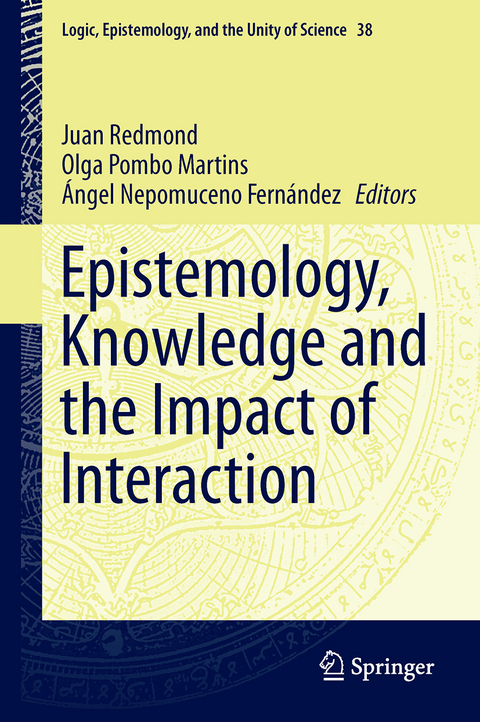
Epistemology, Knowledge and the Impact of Interaction
Springer International Publishing (Verlag)
978-3-319-26504-9 (ISBN)
Juan Redmond is full professor at the University of Valparaíso, Institute oh Philosophy and research fellow at the Conicyt (Chile). He is graduated in Philosophy by the University of Cuyo (Argentina), Master in Literature by the Faculty of Etudes Romanes by the University of Lille 3 (France), with a dissertation untitled Fictions in the work of Jorge Luis Borges: for an artefactual approach and PhD in 2010 in Philosophy, University of Lille 3 (France), with a dissertation on Dialogical logic of fictions. Olga Maria Pombo Martins is graduated in Philosophy by the Faculty of Letters of the University of Lisbon, Master in Modern Philosophy by the Faculty of Social and Human Sciences by the New University of Lisbon, with a dissertation untitled Leibniz and the Problem of a Universal Language, PhD in 1998 in History and Philosophy of Education, University of Lisbon, with a dissertation on Unity of Sciences and disciplinar configuration of Knowledges. At 2009 she presented her Aggregation in History and Philosophy of Science at the Faculty of Sciences of the University of Lisbon (FCUL). She coordinated the scientific projects Encyclopedia and Hypertex (FCT- Sapiens, 1999-2002), Scientific Culture. Conceptual Migrations and Social Contaminations (FCT - Sapiens, 2002-2005) and Image in Science and Art (FCT - PTDC, 2006-2011). Since 2003, she is the coordinator of the research Centre for philosophy of Science of the University of Lisbon (CFCUL). She was the president of the FCUL Department Autonomous unit for History and Philosophy of Sciences from 2007 up until 2012. Angel Nepomuceno is Professor at the University of Sevilla, Departement of Logic and Philosophy of Science. His global research line is the interdisciplinary field Logic, Language and Information, specifically Logic (classical and non-classical), Argumentation Theory, Epistemology and theory of scientific knowledge.
Part 1: The Dynamics of Knowledge I: Proof-Theoretical Approaches and theInteractive Viewpoint.- Chapter1 Granström, Johan: Perennial Intuitionism.- Chapter 2 Piecha, Thomasand Schroeder-Heister, Peter: Atomic Systems in Proof-Theoretic Semantics:Two Approaches.- Chapter 3 Rahman, Shahid; Jovanovic, Radmila and Clerbout,Nicolas: Knowledge and its Game Theoretical Foundations: The Challenge ofthe Dialogical Approach to Constructive Type Theory.- Chapter 4 McAdams,Darryl and Sterling, Jonathan: Dependent types for Pragmatics.- Chapter 5Naibo, Alberto; Petrolo, Mattia and Seiller, Thomas: On the ComputationalMeaning of Axioms.- Part 2 TheDynamics of Knowledge II: Epistemology, Games, and Dynamic Epistemic logic.-Chapter 6 Pacuit, Eric and Roy Olivier: A Dynamic Analysis of InteractiveRationality.- Chapter 7 Hawke, Peter: Relevant Alternatives inEpistemology and Logic.- Chapter 8 Shi, Chenwei: in Knowledge Based onReliable Evidence.- Chapter 9 Baskent, Can: Public Announcements andInconsistencies: For a Paraconsistent Topological Model.- Chapter 10Rebuschi, Manuel: Knowing Necessary Truths.- Chapter 11 Gómez-Caminero,Emilio and Nepomuceno, Angel: Modified Tableaux For Some Kinds Of MultimodalLogics.- Part 3 Argumentation,Conversation and Meaning in Context.- Chapter 12 Martínez, Silvia: Irony as a visual argument.- Chapter 13 Rothenfluch, Sruthi: Ascribingknowledge to Experts: A Virtue-Contextualist Approach.- Chapter 14 Nzokou,Gildas: Defeasible Argumentation in African Oral Traditions. A Special Caseof Dealing with non-Monotonic Inference in a Dialogical Framework.- Chapter15 Puncochár, Vít: Semantics of Assertibility and Deniability.- Chapter 16Salguero-Lamillar, Francisco J.: The quest for the concept in the XXth century:predicates, functions, categories and argument structure.- Part 4 A critical Interlude.- Chapter 17Wolenski, Jan: On Leonard Nelson's criticism of Epistemology.- Part 5 Knowledge and Sciences I: NaturalizedLogic and Epistemology, Cognition and Abduction.- Chapter 18 Woods,John: Logic Naturalized.- Chapter 19 Soler-Toscano, Fernando: ActionModels for the Extended Mind.- Chapter 20 Iranzo, Valeriano: ExplanatoryReasoning: a probabilistic interpretation.- Chapter 21 Pietarinen, Ahti andBelluci, Francesco: The Iconic Moment. Towards a Peircean theory ofdiagrammatic imagination.- Part 6Knowledge and Sciences II: The Role of Models and the Use of Fictions.- Chapter22 Huneman, Philippe: Does emergence also belong to the scientific image?Elements of an alternative theoretical framework towards an objective notion ofemergence.- Chapter 23 Fernández Moreno, Luis: A Comparison Of TheSemantics Of Natural Kind Terms And Artifactual Terms.- Chapter 24 Rivadulla,Andrés: Models, Representation and Incompatibility. A Contribution to theEpistemological Debate on the Philosophy of Physics.- Chapter 25 Sievers,Juliele Maria: Fictions in Legal Science: the Strange Case of the Basic Norm.
| Erscheinungsdatum | 08.10.2016 |
|---|---|
| Reihe/Serie | Logic, Epistemology, and the Unity of Science |
| Zusatzinfo | XIX, 554 p. 33 illus. |
| Verlagsort | Cham |
| Sprache | englisch |
| Maße | 155 x 235 mm |
| Themenwelt | Geisteswissenschaften ► Philosophie ► Erkenntnistheorie / Wissenschaftstheorie |
| Geisteswissenschaften ► Philosophie ► Logik | |
| Geisteswissenschaften ► Philosophie ► Sprachphilosophie | |
| Schlagworte | Argumentative Strategies • Epistemology • interactive rationality • knowledge and game theoretical foundations • knowledge in diagnosing contexts • Logic • Philosophy of Language • probability and explanatory reasoning • Religion and Philosophy • semantics of natural kind terms and artifactual te • semantics of natural kind terms and artifactual terms |
| ISBN-10 | 3-319-26504-0 / 3319265040 |
| ISBN-13 | 978-3-319-26504-9 / 9783319265049 |
| Zustand | Neuware |
| Haben Sie eine Frage zum Produkt? |
aus dem Bereich

![Was heißt Denken?. Vorlesung Wintersemester 1951/52. [Was bedeutet das alles?] - Martin Heidegger](/media/113619842)
